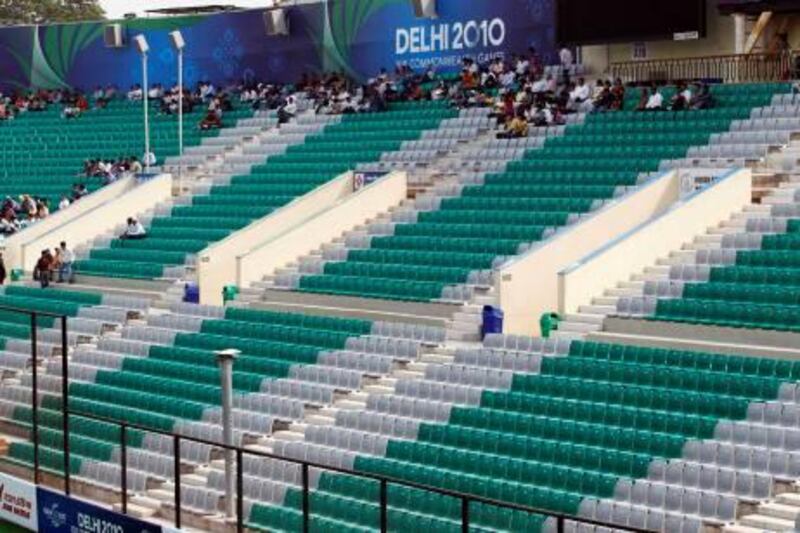To fill stadiums at the Commonwealth Games, the Organising Committee gave away huge numbers of free tickets. But many stadiums were empty during the first week because the freebies were distributed so late that most people could not use them, an official knowledgeable about ticketing said.
Complaints have been pouring in from across the city that tickets are unavailable at box offices and on the Games website, even though the stands end up practically empty when many events begin. The Organising Committee fired the head of ticketing on Saturday. An insider from the Indian Railway and Ticketing Corp, which is in charge of ticketing for the Games, said in an interview that the problem began when the Organising Committee reserved between 30 per cent and 40 per cent of tickets to give away free of charge.
"The OC figured this is not a sporting nation and there won't be much traction for most events," the source said on condition of anonymity. "So they printed bulk tickets to give to schools and sports federations and corporates in the weeks before the event. "But the biggest setback was that they left very little time to distribute the tickets they had already printed out. Most of the tickets ended up lying in cupboards in our office."
Many recipients got their tickets at the last minute. For sessions that began at 9am, the tickets would be received only at 11 the night before. "In quite a few cases, the events had already started when the tickets arrived," the source added. The Organising Committee said that only 10 per cent of tickets were being distributed as complimentary passes. The committee's secretary general, Lalit Bhanot, told reporters at the weekend: "Every day, the order for tickets to be printed for the next day are based on the number of tickets unsold the day before. In the beginning, since tickets were not selling, we distributed some regular tickets as complimentary passes."
The source within the ticket agency disputed that, saying at least three times that number had already been allocated for complimentary passes long before the Games started. He said the key problem was the surge in demand after the opening ceremony on October 3, which was seen as a resounding success and was viewed by an estimated 130 million people across the country. "No one ever thought the opening ceremony would end up being such a spectacular success," he said. "Suddenly everybody wanted a piece of the action."
As sport fans flocked to stadiums to purchase tickets, they often found no more were available, even though venues remained half-empty. Indian media have reported stacks of complimentary tickets found dumped in waste bins outside stadiums. Even headline events, such as the 100 metres track final on Thursday night, took place before a sea of empty seats. Only about 20 per cent were occupied. After sacking the top ticketing official, the Organising Committee tried to shift the blame to corporate clients failing to make use of their freebies.
The new head of ticketing, Monica Jolly, told reporters yesterday: "We have done a lot of bulk orders for corporates. They are big bulk orders. People sometimes don't turn up if they get tickets through promotions." Mr Bhanot said that only around one million tickets have been sold out of a total of 1.7 million, but failed to explain why so few of the remainder are available to the public. A report in the Times of India yesterday appeared to confirm that the problem lay in distribution. It stated that for the boxing match featuring Indian Olympic medallist Vijender Singh, "baskets of complimentary passes were delivered to the venue for distribution more than halfway through the bout".
It quoted an official as saying: "The passes are of no use when they reach the venue at that time." Mike Fennell, president of the Commonwealth Games Federation, has announced that an investigation would be launched to determine what went wrong with the ticketing. "We get a lot of complaints about people being unable to buy tickets," Mr Fennell told reporters yesterday. "If people go to the ticketing counters and they don't get tickets, there is a problem."
Another concern has been the disastrous state of its media information service, a severe embarrassment for a country renowned for its IT prowess. There have been frequent problems receiving basic information such as results, schedules, statistics and biographies through the official website, and a new one had to be created on Saturday to try to make amends. "It has not been good on the information system. We continue to work and see how we can correct the glitches," Mr Fennell said.
foreign.desk@thenational.ae





